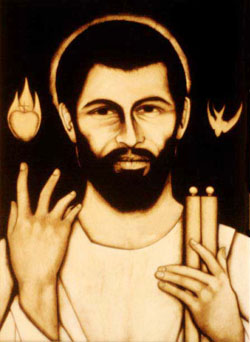
.
“You
Are Our Brothers”
.
by
Augustine of Hippo (185-254 AD)
We entreat you, brethren [brothers and sisters], as earnestly
as we are able, to have charity, not only for one another, but also for
those who are outside the Church. Of these some are still pagans, who have
not yet made an act of faith in Christ. Others are separated, insofar as
they are joined with us in professing faith in Christ, our head, but are
yet divided from the unity of his body. My friends, we must grieve over
these as over our brothers. Whether they like it or not, they are our brothers;
and they will only cease to be so when they no longer say our Father.
The prophet refers to some men saying: When they say to you: You
are not our brothers, you are to tell them: You are our brothers. Consider
whom he intended by these words. Were they the pagans? Hardly; for nowhere
either in Scripture or in our traditional manner of speaking do we find
them called our brothers. Nor could it refer to the Jews, who did not believe
in Christ. Read Saint Paul and you will see that when he speaks of "brothers,"
without any qualification, he refers always to Christians. For example,
he says: Why do you judge your brother or why do you despise your brother?
And again: You perform iniquity and commit fraud, and this against your
brothers.
Those then who tell us: You are not our brothers, are saying that we
are pagans. That is why they want to baptize us again, claiming that we
do not have what they can give. Hence their error of denying that we are
their brothers. Why then did the prophet tell us: Say to them: You are
our brothers? It is because we acknowledge in them that which we do not
repeat. By not recognizing our baptism, they deny that we are their brothers;
on the other hand, when we do not repeat their baptism but acknowledge
it to be our own, we are saying to them: You are our brothers.
If they say, "Why do you seek us? What do you want of us?" we should
reply: You are our brothers. They may say, "Leave us alone. We have nothing
to do with you." But we have everything to do with you, for we are one
in our belief in Christ; and so we should be in one body, under one head.
And so, dear brothers, we entreat you on their behalf, in the name of
the very source of our love, by whose milk we are nourished, and whose
bread is our strength, in the name of Christ our Lord and his gentle love.
For it is time now for us to show them great love and abundant compassion
by praying to God for them.
[Excerpt from A
Discourse on the Psalms by Saint Augustine, bishop(Ps. 32, 29; CCL
38, 272-273).]
See
related articles:
 Aurelius
Augustine was born in 345 in the town of Tagaste, in Roman North Africa,
in what is today Algeria. His mother was Monica, a very devout Christian
who had a significant influence on her son’s life. His father, named Patricius,
was a pagan of significant status in society. Patricius became a Christian
shortly before his death. Aurelius
Augustine was born in 345 in the town of Tagaste, in Roman North Africa,
in what is today Algeria. His mother was Monica, a very devout Christian
who had a significant influence on her son’s life. His father, named Patricius,
was a pagan of significant status in society. Patricius became a Christian
shortly before his death.
Augustine was educated at
Carthage where he enjoyed academic success. He also enjoyed the party life,
and at the age of 17 fell in love with a woman whom he never named. They
lived together unmarried for 13 years and had a son whom Augustine named
Adeodatus, meaning “gift from God.” His son died in his youth.
At the age of 19, after reading
Cicero's Hortensiusat, Augustine fell in love with philosophy. He
later wrote, “It gave me different values and priorities. Suddenly every
vain hope became empty to me, and I longed for the immortality of wisdom
with an incredible ardour in my heart.” While he pursued Platonic philosophy
and the theology of the Manichaens, a Christian heretical sect, he became
restless for truth and virtue. Shortly before his 30th birthday, Augustine
encountered Ambrose, the saintly bishop of Milan. Augustine was moved by
Ambrose’s example and his inspired teaching and preaching of the gospel.
At the age of 32 Augustine found peace with God and was baptized by Ambrose
during the Easter liturgy in 387. Augustine returned to North Africa and
formed a monastic community with a group of friends. He was ordained a
priest in 391 and became a noted preacher. In 396 he reluctantly became
a bishop and remained the bishop of Hippo until his death in 430. He left
his monastic community, but continued to lead a monastic life with the
parish priests of Hippo in his episcopal residence. Augustine died on August
28, 430, during the siege of Hippo by the Vandals.
Augustine was a prolific
writer and original thinker. His numerous writings, including theological
treatises, sermons, scripture commentaries, and philosophical dialogues,
number into the hundreds. His autobiography, the Confessions, was
considerded the first Western autobiography. It was highly read among his
contemporaries and has continued as a classic throughout the ages.
Augustine is one of the most
important figures in the development of Western Christianity. He is esteemed
as a great Latin church father and a Doctor of the Roman Catholic Church.
Many Protestants consider him to be one of the theological fathers of Reformation
teaching. Among Orthodox he is called St. Augustine the Blessed. |